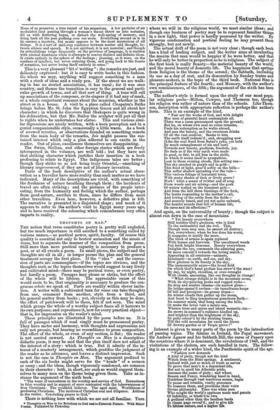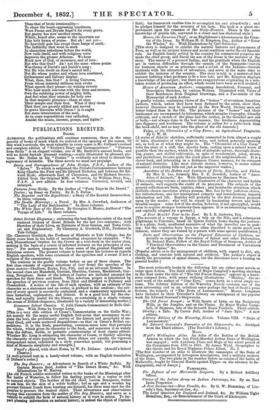THOUGHTS ON MIN. * TICE notion that verse constitutes poetry is
pretty well exploded, but too much importance is still ascribed to a something called by various names,—as poetical power, spirit, faculty. Of course this quality is essential not only to bestow animation and the music of verse, but to separate the manner of the composition from prose. Still more than mere poetical capacity is necessary to produce a poet, or at all events a poem. In small pieces, the subject and the thoughts are all in all • in longer poems the plan and the general treatment occupy the first place. If the " idea " and the succes- sion of parts are commonplace—if the topics are obvious, and the thoughts such as the topics themselves would suggest to any lively and cultivated mind—there may be poetical verse, or even poetry, but hardly a poem. Passages may please or strike, but the effect of the whole will be lifeless. The appreciable cause of this would seem to be, that originality is necessary to produce the con- gruous whole we speak of. Parts are readily within clever imita- tion. A writer with a cultivated turn for verse can take thoughts from one ornament from another, style from a third, and his genera matter from books; • yet, cleverly as this may be done, the effect of patchwork will be there, felt if not seen. The mind which grasps the whole of a worthy subject fuses all it borrows to its own purposes, and reproduces it, new for every practical object— that is, for impression on the reader's mind. These principles are illustrated by the poem before us. It is full of passages which if read singly must be pronounced poetry. They have metre and harmony, with thoughts and expressions not only not prosaic, but bearing no resemblance to is composition. The effect of the whole, or even of any section' Is flat ; the reader is not carried onward. As Thoughts on Man is a descriptive- didactic poem, it may be said that the plan itself does not admit of the interest of a story : which is true. But it admits of the in- terest of a masterly arrangement, which gratifies the judgment of the reader as he advances, and leaves a distinct impression. Such is not the case in Thoughts on Man. The argument prefixed to each of the six books might serve for the " heads " of a sermon or essay ; and the ideas, though vigorously condensed, are common in their character : both, in short, are such as would suggest them- selves to many men on the theme being given them. Take as in- stance the argument of the sixth book.
"The want of earnestness in the worship and service of God. Earnestness in false worship and in support of error contrasted with the lukewarmness of true Christians. The youthful believer. The aged saint. Worldliness of professing Christians. The motives of Christian zeal and diligence. Address to the reader. Concluding prayer to God."
There is nothing here with which we are not all familiar. Turn • Thoughts on Man in his Relations to God and to External Nature. With Miner Poems. Published by Pickering. where we will in the religious world, we meet similar ideas ; and though one business of poetry may be to represent familiar things in a new light, that power is hardy possessed by the writer. By vigorous condensation and poetical feeling he may present them strongly, but not newly. The actual drift of the poem is not very clear ; though each book has a kind of leading subject, and the writer aims at inculcating the maxim that man would be happier if he were better, and that he will only be better in proportion as he is religious. The subject of the first book is really Beauty—the material beauty of the world, and the moral beauty of domestic life. The happiness that springs from Religion is the theme of the second; the Sabbath, including its use as a day of rest, and its desecration by Sunday trains and pleasure-seekers is the topic of the third book. National Sins is the principal feature of the fourth; and Memory, with the author's own reminiscences, of the fifth; the argument of the sixth has been quoted. The author's style is formed upon the study of our most 'popu- lar religious poets—Milton, Cowper, and Thomson too, though his religion was rather of nature than of the schools. Like Thom- son, description with appropriate reflection is perhaps the author's forte. This is an example of the kind.
"Fair ars the works of God, and with delight May men of grateful heart contemplate all. There was a curse pronounced upon the ground; But he on whose own soul no curse remains, Feels his redemption as be walks abroad, And sees the beauty, and the sweetness drinks Of all the vast creation. Seems to him The earth itself redeem'd ; and, struggling now (Like the soul freed from Satan's yoke, yet held By much entanglement of sin and lust) Towards new beauty, goodness, freedom, joy, He feels as if the very earth were made So good, so fair, to aid him in the strife, In which it seems itself to sympathize. Look to those evening clouds, this setting sun— This sky enrobed in purple and in gold— This flood of light, pour 'd softly on the hills— This softer shadow spreading o'er the vale— This various foliage of luxuriant trees, With many shades of dark or lively green ! Hark ! what a sound of twitter and of song From woods and air arising—and the gush Of waters wafted on the transient gale— And from the hill these bleatings of the flock, The lambs responding to the mother's call, And lowing of the cattle from the fields— And scarcely heard, and yet not quite unheard, The hamlet sounds that tell of human life, Its cares and its affections!"
And again on the universality of beauty; though the subject is almost run down in the case of mountains.
"Yet beauty everywhere Still testifies God's goodness, who is kind To the unthankful and the evil. This, Though man may mar, he cannot all destroy; But, everywhere when he has done his worst, It reappears to testify the more. The track of armies is again replaced With homes and harvests. The uncultured weeds Put forth bright blossoms. Beauty everywhere Delights the eye, commands the admiring gaze, Or more concettPd rewards the loving Appearing in all creatures—animate, Inanimate—in earth, and sea, and sky.
How glorious in its beauty is the sky.,
The immeasurable azure—the broad field On which God's hand profuse has strew'd the stars!
By day, by night, cloudless, or over-wrought With clouds, unceasing, like our thoughts in change ! "What strange delight is in the mountain scene,
With its sky-piercing peaks and rugged rocks— Its deep and sombre chasms—its narrow glens—
Its bridge-spamed ravines —its tumultuous heaps
Of hill and precipice—its grassy slopes—
Its winter clouds that gather up the storm,
And burst to fling tempestuous grandeurs forth—
Its summer mists, that hang among the hills, Or make the lower vale a mimic sea,
Whence trees and spires and island summits rise—
Its snows in summer's radiance kindled up, And brighter than the brightness of the sky, Or • y colour'd by the slanting beams, the cold mountains far excel the bloom Of flowery garden or of Tropic grove !"
Interest is given to many parts of the poem by the introduction of passing topics. The famine in Ireland, the Papal movement, Sir Andrew Agnew and his Sabbath Bill, the curse of Popery upon the countries where it is dominant, the revolutions of 1848, and the visitations of the cholera, are each handled in turn. The follow- ing is an example of a wider kind, the Pantheistic spirit of the age.
"Fashion now demands A kind of piety, though not the kind Which from the Bible springs. A sentiment, Imbued with just so much of truth as serves To prove that man's is a dependent life, But not to quell his Atheistic pride, Assumes the name of piety; and where Reason and Fancy, wandering hand in hand, Guideless through vast tenebrous scenes, begin To pause and tremble, vanity presumes To reassure them, and proclaims their voice Divine philosophy. Time was when men Who sought the world's applause made mad parade Of Infidelity, or blush 'd to own
A godhead other than the heathen bards Tn classic page reveard; and to give life
To lifeless nature, and a higher life
Than that of brute irrationality—
To cheer the heart-oppressing loneliness, Were Fauns and Dryads feign'd for every grove. But poetry has now another strain, Which, heard afar, seems to the uncertain ear
Like holy hymn of praise. But ah ! not yet—
No heavenly gale has swept these harps of earth : The Infidelity that wont to stalk In shameless nakedness before the world, Now veils itself, and with religious voice Reproves the grosser Atheism. We hear Much now of God, of reverence, and of love : But who this God? Ah! not the same whose praise Was theme of David's and laaiah's song ; Not He who dwelt on Zion's sacred bill; Not He whose justice and whose love combined, Gethsemane and Calvary display. What, then, this God ? A hying Universe, From whose material stillness men evoke What speech they please—in waking reverie Who hold much converse with the trees and streams, Own the subduing power of mighty hills, And feel what they mistake for holy awe In that majestic presence—these at once Their temple and their God. What if they deem That they are greatly edified and moved In grave discourse with Ocean ? is it aught But mere intoxication of the soul,
As in some superstitious vast cathedral,
Amidst the music, incense, pomp; and lights !"



































 Previous page
Previous page